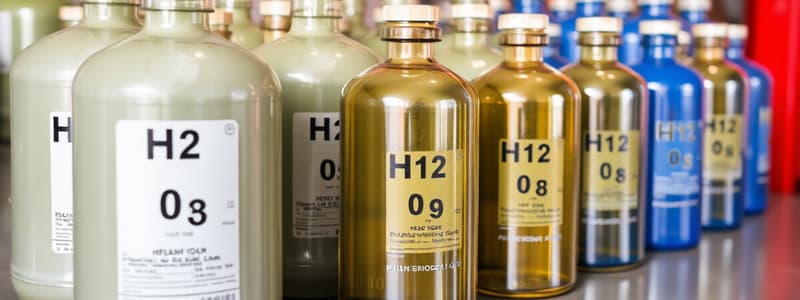Podcast
Questions and Answers
What can cause hydrogen gas to ignite spontaneously in the air?
What can cause hydrogen gas to ignite spontaneously in the air?
- Specific container geometry (correct)
- Temperature of surrounding materials
- High humidity levels
- Proximity to electrical sources
Which parameter does NOT affect the detonation characteristics of hydrogen gas?
Which parameter does NOT affect the detonation characteristics of hydrogen gas?
- Humidity of the environment (correct)
- Critical detonation temperature
- Critical detonation pressure
- Container geometry
Why is understanding the detonation parameters of hydrogen gas crucial?
Why is understanding the detonation parameters of hydrogen gas crucial?
- To enhance its combustion properties
- To reduce its production cost
- To improve its storage efficiency
- To minimize the risk of explosion (correct)
What aspect of hydrogen storage is critical for preventing detonation?
What aspect of hydrogen storage is critical for preventing detonation?
Which of the following statements about the storage of hydrogen gas is true?
Which of the following statements about the storage of hydrogen gas is true?
What is one potential cause of fatal accidents related to hydrogen?
What is one potential cause of fatal accidents related to hydrogen?
Which factor is most critical in preventing fatal hydrogen accidents?
Which factor is most critical in preventing fatal hydrogen accidents?
Which safety measure is often overlooked in hydrogen-related environments?
Which safety measure is often overlooked in hydrogen-related environments?
What misconception might lead to increased risks during hydrogen handling?
What misconception might lead to increased risks during hydrogen handling?
What element is essential to consider alongside hydrogen when assessing safety risks?
What element is essential to consider alongside hydrogen when assessing safety risks?
What is one of the primary applications of hydrogen technology mentioned?
What is one of the primary applications of hydrogen technology mentioned?
Which aspect of hydrogen does NOT relate to its implementation?
Which aspect of hydrogen does NOT relate to its implementation?
What was one of the first significant applications of hydrogen gas?
What was one of the first significant applications of hydrogen gas?
What is emphasized regarding best practices in hydrogen use?
What is emphasized regarding best practices in hydrogen use?
What should be a priority in case of an emergency involving hydrogen?
What should be a priority in case of an emergency involving hydrogen?
During what period was hydrogen gas prominently used in airships?
During what period was hydrogen gas prominently used in airships?
Where can information about hydrogen technology typically be found?
Where can information about hydrogen technology typically be found?
Which type of air vehicle utilized hydrogen gas for lift?
Which type of air vehicle utilized hydrogen gas for lift?
What characteristic made hydrogen gas suitable for use in airships?
What characteristic made hydrogen gas suitable for use in airships?
What was a major drawback of using hydrogen gas in airships?
What was a major drawback of using hydrogen gas in airships?
What element is being evaluated for safety in the given content?
What element is being evaluated for safety in the given content?
Which of the following gases is commonly associated with safety concerns in various applications?
Which of the following gases is commonly associated with safety concerns in various applications?
Hydrogen is known to be flammable. What does this imply about its safety?
Hydrogen is known to be flammable. What does this imply about its safety?
In which scenario might hydrogen be deemed unsafe?
In which scenario might hydrogen be deemed unsafe?
What is a critical factor for ensuring the safety of hydrogen usage?
What is a critical factor for ensuring the safety of hydrogen usage?
What is a critical factor in ensuring hydrogen safety during transportation?
What is a critical factor in ensuring hydrogen safety during transportation?
Which property of hydrogen contributes to its flammability?
Which property of hydrogen contributes to its flammability?
What is a recommended practice for handling hydrogen safely in a laboratory setting?
What is a recommended practice for handling hydrogen safely in a laboratory setting?
What is one of the most significant hazards associated with hydrogen storage?
What is one of the most significant hazards associated with hydrogen storage?
What potential misconception about hydrogen refueling stations should be addressed?
What potential misconception about hydrogen refueling stations should be addressed?
Flashcards
Fatal Accidents
Fatal Accidents
A common term for unfortunate incidents resulting in death, often associated with specific causes like hydrogen.
Hydrogen
Hydrogen
A chemical element known for its highly flammable nature.
Flammable
Flammable
A highly reactive chemical element with a tendency to ignite easily.
Accidents
Accidents
Signup and view all the flashcards
Hydrogen Accidents
Hydrogen Accidents
Signup and view all the flashcards
What are airships?
What are airships?
Signup and view all the flashcards
What was the first gas used in airships?
What was the first gas used in airships?
Signup and view all the flashcards
How did hydrogen make airships fly?
How did hydrogen make airships fly?
Signup and view all the flashcards
When were airships popular?
When were airships popular?
Signup and view all the flashcards
What's an early use of hydrogen?
What's an early use of hydrogen?
Signup and view all the flashcards
Hydrogen's Flammability
Hydrogen's Flammability
Signup and view all the flashcards
Detonation Parameters
Detonation Parameters
Signup and view all the flashcards
Critical Detonation Pressure
Critical Detonation Pressure
Signup and view all the flashcards
Critical Detonation Temperature
Critical Detonation Temperature
Signup and view all the flashcards
Container Geometry's Role
Container Geometry's Role
Signup and view all the flashcards
Hydrogen Safety
Hydrogen Safety
Signup and view all the flashcards
Hydrogen Reactivity
Hydrogen Reactivity
Signup and view all the flashcards
Hydrogen Storage
Hydrogen Storage
Signup and view all the flashcards
Hydrogen Safety Protocols
Hydrogen Safety Protocols
Signup and view all the flashcards
Hydrogen Production
Hydrogen Production
Signup and view all the flashcards
Hydrogen Distribution
Hydrogen Distribution
Signup and view all the flashcards
Hydrogen Applications
Hydrogen Applications
Signup and view all the flashcards
Hydrogen Safety and Best Practices
Hydrogen Safety and Best Practices
Signup and view all the flashcards
Hydrogen's Dual Nature
Hydrogen's Dual Nature
Signup and view all the flashcards
Hydrogen's Leakage Potential
Hydrogen's Leakage Potential
Signup and view all the flashcards
Hydrogen's Explosive Potential
Hydrogen's Explosive Potential
Signup and view all the flashcards
Hydrogen Embrittlement
Hydrogen Embrittlement
Signup and view all the flashcards
Study Notes
Introduction to Hydrogen Technologies and Applications (CHEG 360) - Fall 2024
- Course covers hydrogen technologies and applications
- Specific lecture focused on safety related to hydrogen (Ch1-2)
- Lecturer: Dr. Lourdes F. Vega
- Additional lecturer: Dr. Daniel Bahamon Garcia
- Date: September 5th, 2024
Lecture 4: Hydrogen Safety (Ch 1-2)
-
Outline: Hydrogen generation, storage, and utilization (Zhang et al. 1.1-1.3), Hydrogen facts, fundamental aspects of Hydrogen, safety (historical accidents, properties, risks in supply chain, hazard analysis, codes, standards, public perception – comparison with other fuels)
-
Hydrogen Properties:
-
Odorless, tasteless, non-toxic, non-corrosive
-
Small molecular weight and size, highly diffusive, low viscosity
-
High buoyancy (proportional to diffusion coefficient and changes with temperature)
-
Additional bibliographical references:
-
Provided links to various documents about Hydrogen applications and safety considerations, hazard analysis, risk assessment, etc.
-
Hydrogen in Airships:
-
Early use in dirigibles and zeppelins
-
Advantages: abundance, lower cost than helium, excellent lift
-
Safety concerns: flammable, highly explosive
-
World War I use for bombing. Gas safety considered through separation from air to prevent combustion
-
Hindenburg Disaster:
-
May 6, 1937 incident in New York City
-
Focus on the investigation of the cause of the explosion
-
Investigation of the Hindenburg Accident:
-
Speculation of sabotage, inconclusive
-
Leakage(s) in the gas cells as probable cause (possibly failed support wire, during landing)
-
Flammable hydrogen-air mixture leading to explosion
-
Other Fatal Hydrogen Accidents (Discussion topic):
-
Student groups to research on the topic and present results over 5 minutes
-
Hydrogen Liquid Properties:
-
Liquid below -253° C at atmospheric pressure
-
Cryogenic liquid, severe freeze burns if contact occurs
-
Double-walled, vacuum-jacketed and insulated containers for storage
-
Properties of Liquid Hydrogen:
-
Vapor cloud formation, fog potentially hazardous
-
High Thermal expansion coefficient compared with water
-
Less volatile, cleaner, and more economical storage at lower temp/pressure
-
At higher temperatures becomes more volatile, but severely attacks mild steels.
-
Safety and precautions:
-
Understanding hazard signals, associated materials (e.g., SDS), with Liquid/Hydrogen
-
Safety considerations, flammability, and explosions, containment issues
-
Properties of Hydrogen compared to other fuels:
-
Comparison table highlighting differences in color, toxicity, odor, buoyancy, energy by weight, energy by volume, flammability limits in air, and flame temperatures
-
Safety comparison with respect to other fuels:
-
Hydrogen's combustion, flammability, and explosion risk compared with other fuels (natural gas and gasoline).
-
Hydrogen produces heat and water, carbon not produced, and water vapor absorbs heat. Therefore, there is less power to disperse heat by a hydrocarbon fire.
-
Hydrogen's very wide flammability range (4% - 74%), in addition to its ability to form explosive mixtures, require particular handling and safety protocols
-
Public perception of Hydrogen:
-
Factors influencing public perception: Expert vs. general public opinions
-
Pyramid model incorporating influences, actions, what we say/think to depict public perceptions, and the Hindenburg disaster as an influence
-
Questions regarding public perceptions and if an individual would purchase a hydrogen car, and opinions on travelling using hydrogen-powered transportation
-
Safety and precautions related to storage:
-
Hydrogen gas ignites spontaneously in air
-
Detonation parameters (pressure, temperature), dependent on geometry
-
Handling with extreme care, caution required in gaseous or liquid forms.
-
H2TRUST - EU Project/Book Objectives:
-
Developing an informative guide for non-experts regarding hydrogen
-
Covering areas: what is hydrogen?, main applications (especially fuel cells), location of hydrogen distribution, production/storage procedures/applications, safety info and best practices (H2TRUST)
-
Course Conclusion and Messages:
-
Safety based on standards and procedures for hydrogen
-
Different standards for handling hydrogen production/storage/use/application
-
Importance of education to enhance acceptance and utilization.
Studying That Suits You
Use AI to generate personalized quizzes and flashcards to suit your learning preferences.





